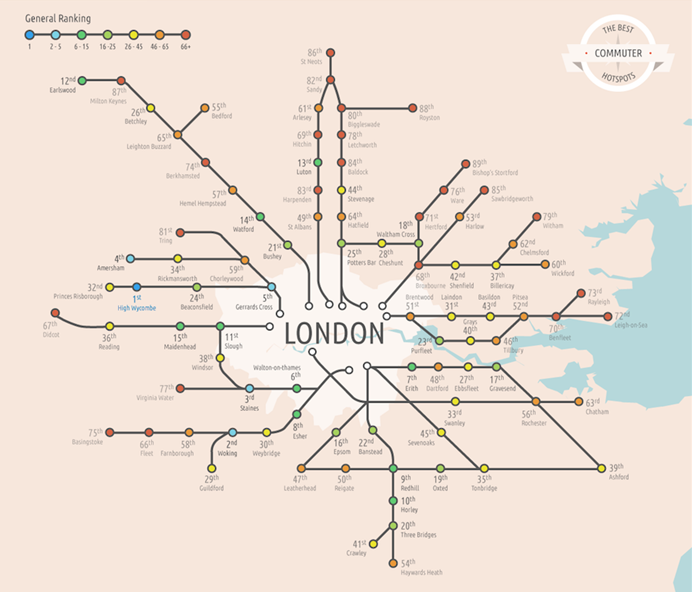Work in London, but can’t afford to actually live there? Frost loves TotallyMoney.com’s brilliant new property ladder calculation tool. It lets you work out exactly in which commuter town you could own your first home…
Many of us have had our dreams of actually owning a property in London firmly shattered; lack of affordable housing in the capital coupled with pay freezes and mortgage company demands for increasingly large deposits means that most people in their 20s and 30s have accepted it might never happen. In fact, recent figures show that the number of families on a modest income owning their own home there has more than halved over the last decade, falling to just 13 per cent.But London is still where most of the work is – so what’s the answer?
If you don’t fancy paying cripplingly huge amounts of rent to unscrupulous landlords, many people look to buy or rent just outside of the big smoke, in a town with a reasonable commute. But where do you actually start? There’s bound to be a lot of research to be done into finding out what average house prices are elsewhere, how long a particular commute would be, which towns are even desirable (and have at least one local pub) – the list is endless, and in the meantime, house prices are only going to be ticking steadily upwards…
Well, panic not, for help is at hand. Money comparison site TotallyMoney.com has just launched its new online tool for people who want to get onto the property ladder, and work in London, but can’t afford to buy there. In one simple process, you can set parameters to reflect the maximum time you’d be happy to spend on a commute, how much you can afford to spend on train travel, the value of the property you could afford to buy, and the amount of your disposable income. Then you’ll be presented with a selection of towns which match your criteria – meaning you can start searching for a new home in earnest.
TotallyMoney.com has even put together a list of the top ten best commuter towns, and High Wycombe – with a London commute time of only 30 minutes, travel costs of around £4,180, and suitable for those with a disposable income of around £23,341 – is in first place. If you’re keen to keep train time to a minimum, however, Esher, in Surrey (ranked 8th), is a mere 27 minutes away from London, with annual travel costs coming in at about £2,124. If you’re looking for a bargain in terms of property, Erith, in the London borough of Bexley is ranked at number 7, with the cheapest average property price at £238,459, and an annual travel cost of only £1,912 (although it would take a little longer, at 44 minutes).
| # | Town | County | House Price | Season Ticket | Time | Average Disposable Income Per Head. Per Year |
| 1 | High Wycombe | Buckinghamshire | £346,197.00 | £4,180.00 | 30 | £23,341.00 |
| 2 | Woking | Surrey | £433,235.00 | £3,080.00 | 27 | £21,437.00 |
| 3 | Staines | Middlesex | £349,604.00 | £2,484.00 | 35 | £21,539.00 |
| 4 | Amersham | Buckinghamshire | £542,856.00 | £3,368.00 | 34 | £23,341.00 |
| 5 | Gerrards Cross | Buckinghamshire | £792,177.00 | £3,328 | 28 | £23,341.00 |
| 6 | Walton-on-thames | Surrey | £524,145 | £2,412 | 33 | £21,437.00 |
| 7 | Erith | Outer London North & West | £238,459 | £1,912 | 44 | £21,539.00 |
| 8 | Esher | Surrey | £878,831 | £2,124 | 27 | £21,437.00 |
| 9 | Redhill | Surrey | £338,593 | £2,696 | 38 | £21,437.00 |
| 10 | Horley | Surrey | £340,407 | £3,208 | 35 | £21,437.00 |

